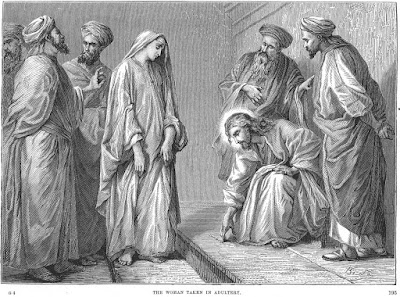Go and Sin No More: The Fifth Sunday of Lent
The scribes and the Pharisees brought a woman who had been caught in adultery and made her stand in the middle. They said to him, “Teacher, this woman was caught in the very act of committing adultery. Now in the law, Moses commanded us to stone such women. So what do you say?” They said this to test him, so that they could have some charge to bring against him.
Jesus bent down and began to write on the ground with his finger.But when they continued asking him, he straightened up and said to them, “Let the one among you who is without sin be the first to throw a stone at her” …
Jesus [said to the woman], “Woman, where are they? Has no one condemned you?” She replied, “No one, sir.”
Then Jesus said, “Neither do I condemn you. Go, and from now on do not sin any more.”
—John 8:1-7, 10-11
Blessed Charles de Foucauld (d. 1916), a soldier and explorer, monk and priest, missionary and martyr, once wrote, “We are all children of the Most High. All of us: the poorest, the most outcast, a newborn child, a decrepit old person, the least intelligent human being, the most abject, an idiot, a fool, a sometimes sinner, the greatest sinner, the most ignorant, the last of the last, the one most physically and morally repugnant — all children of God and sons and daughters of the Most High. … We should love all humankind, for they are all children of God.”
Our dignity and worth as people is simply based on the reality that we are all daughters and sons of God. All the good that is within us — our hope, our faith, our love — are gifts from our Creator.
The story of the woman caught in adultery that we hear in this Sunday’s Gospel reminds us that sin — turning away from God and acting against our own dignity and worth — is not an ending. Because God’s love and mercy are unlimited, the gift of a renewed, ever-deepening life in Christ is available to each one of us. The cultural and religious leaders of Jesus’ time, however, were enraged by the woman’s actions and no longer saw a child of God standing in front of them. Instead, they stripped away the woman’s humanity and reduced her to her sin — a sin to be punished. But Jesus recognized her for who she was, forgave her and restored her relationship with God: “Has no one condemned you? Neither do I condemn you. Go your way, and from now on do not sin again.”
However we might have sinned or separated ourselves from God’s merciful love in the past, conversion and forgiveness are always possible. Our hope is founded on the new life offered to each one of us by the risen Christ.
The invitation for us this Sunday, then, is to continue to grow in our relationship with Christ by sharing in the Cross. This is the only way we can really discover the power of the Resurrection. This means that we are being called to forget what lies behind us and move forward, as pilgrims journeying together “in pursuit toward the goal, the prize of God’s upward calling in Christ Jesus” (cf. the Second Reading, Philippians 3:12-14). Then, and only then, can we find forgiveness and claim our true dignity and identity as daughters and sons of God.
How quick are you to throw stones at others when they have fallen? What would it mean for you to replace judgment with compassion?
What realities in your life — relationships, status, pride, etc. — have kept you trapped in the past? How has God’s mercy set you free in the past?
How are you being invited to share the Cross of Jesus as we journey together toward Easter? Are you being asked to help another person carry their cross as Simon of Cyrene helped Jesus in the Way of the Cross?
Words of Wisdom: “See what a mystery this is, and see the goodness of Christ! While the woman is being accused, Christ bends down; when her accusers go out he looks up. If you want to know the meaning of the words, ‘Go, and sin no more,’ let me tell you. Christ has set you free. Let grace now set right in you what punishment has been unable to correct.”—St. Ambrose of Milan
This reflection was originally written for Aleteia.org and posted on their website on March 12, 2016.




Comments
Post a Comment